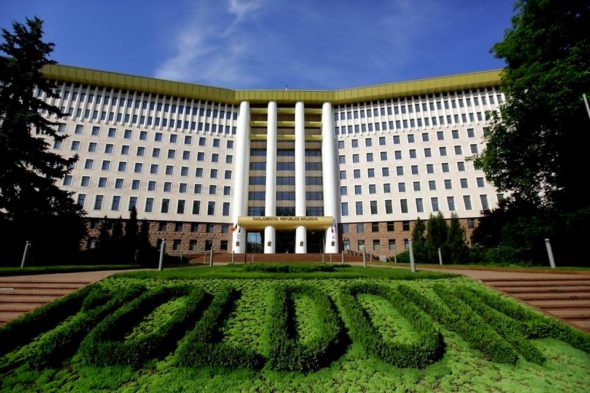– It is virtually certain that the current situation is largely due to deliberate action by Russia against the new authorities in Chisinau and their pro-EU policy, and that the inability to reserve capacity, which Gazprom uses to explain the drop in supplies to Moldova, is merely a pretext – write Kamil Całus and Agata Łoskot-Strachota, experts from the Centre for Eastern Studies.
Since 1 October supplies of Russian gas to Moldova have dropped to approximately two thirds of the country’s demand for this resource (excluding Transnistria). Russia argues that this situation is due to the ongoing Russian-Moldovan negotiations regarding a new gas contract. The current agreement (signed in December 2020) expired on 30 September and was on that day extended until the end of October to allow the talks to continue. Gazprom argues that this made it impossible to reserve the appropriate monthly capacities in transit gas pipelines in Ukraine. Moldova also faces an increase in gas prices on the European stock markets (the gas price for the Moldovan company Moldovagaz is linked in the agreements with Gazprom to its price on the German hub). While in 2020 Moldova paid an average of US$148.9 for 1tcm of gas, in September this year (according to the declaration of Moldova’s Deputy Prime Minister and Infrastructure and Regional Development Minister Andrei Spînu) the gas price reached US$550, and US$790 in October.
The gas shortage was initially fixed by the Moldovan side by using so-called ‘technical gas’ from gas pipelines which makes it possible to maintain the necessary pressure; this resulted in decreased pressure and reduced the effectiveness of the infrastructure. On 6 October Moldovagaz called on large industrial gas recipients to limit their use of gas and appealed to companies (including heating power plants) to switch to alternative fuels (mainly oil and oil-based fuels). The Moldovan government is preparing a series of measures aimed at protecting the most vulnerable gas recipients from consequences of gas shortages and increased gas prices. According to the declaration made by the government, until a new gas contract with Gazprom is signed, the prices for commercial and individual gas users will not change. On 11 October Mr Spînu asked the EU countries for emergency gas supplies, mentioning that the price required by Gazprom is not justified or realistic and that Moldova, apart from the talks with Russia, is also seeking to ensure alternative supplies from Romania and Ukraine
Moldova has not yet succeeded in diversifying its gas supplies or launching gas imports through the Iași–Ungheni interconnection gas pipeline which links Moldova with Romania and has a capacity of 1.5 bcm of gas annually. Even though the construction of the section from Ungheni to Chisinau was completed in 2020, there are still many obstacles which hamper the launching of gas supplies: the pipeline network within Moldova remains controlled by Gazprom, and Romania has not yet started extracting gas from the new gas fields in the Black Sea as planned. (Moldova will be among the countries receiving exports). It has also been alleged that the gas pipeline has not been formally commissioned by the Romanian side (there is no confirmation from Transgaz, the Romanian operator). Moldova argues that the route can become operational for commercial use from 4 October. As a result, despite the fact that alternative gas pipelines infrastructure exists, Moldova remains completely dependent on gas supplies from Russia. The country does not have its own gas storage facilities either.
The problems with the Romanian interconnection gas pipeline are one of the main causes which make the Moldovan-Russian talks regarding the new gas supplies contract more difficult; the talks have been underway since summer 2020. Due to Moldova being fully dependent on one gas supplier, it has little chance of negotiating more advantageous terms and conditions. Furthermore, in the talks Gazprom has been raising the issues of Moldova’s debt for the gas supplies in the last decade (the debt now amounts to US$722 million, together with added fines but without the debt incurred by Transnistria) and the implementation of the EU third energy package in Moldova. Moldova’s problems are further compounded by the situation on the European gas markets and record-high gas prices. In consequence, the price that Moldova has been paying for Russian gas since September is many times higher than the price it paid in the previous year.
A decline in gas imports affects the stability of electricity supplies in Moldova. Three heating power plants situated on the right bank of the country (controlled by Moldova) are gas fueled. They are capable of meeting merely 20% of the country’s demand for electricity, the remaining 80% is imported mainly from the power plant Moldavskaya GRES located in Transnistria and controlled by the Russian state-owned company RAO UES. This power plant is however also fueled by gas contracted by Moldovagaz. On 7 October the management of the plant reported that it could reduce the production of electricity due to decreased gas supplies.
The persisting record gas prices, along with a possible gas shortage and disrupted electricity supplies in autumn and winter will undoubtedly have a negative impact on the support for the pro-Western Party of Action and Solidarity (PAS) government which was formed in Moldova following an early parliamentary election held on 11 July this year. It is nearly certain that the present situation stems to a large extent from Russia’s deliberate actions against the new government in Moldova and its pro-EU politics. The impossibility of booking adequate transmission capacities – the argument Gazprom uses while explaining the decrease in gas supplies to Moldova — seems merely to be a pretext. According to the information from the Ukrainian operator OGTSU, reported by the commodity intelligence services provider ICIS, Gazprom has already reserved entry capacities in Ukraine and needs only book exit capacities to Moldova. OGTSU is said to have offered to use the capacities reserved to supply gas to Hungary since flows in this direction stopped on 1 October 2021. Moreover, as part of the EU gas capacity auction system (also used by Moldova), gas capacities can be reserved not only in the form of annual, quarterly or monthly products but also as daily products.
The current situation is an important test for the EU’s policy towards Moldova. It presents an opportunity to strengthen bilateral relations, including energy integration in an emergency situation and in a critical gas sector. Nevertheless, it is difficult to foresee if and how the EU will be able to help Moldova since Moldova is confronted not only with the issue of gas shortages but also its exorbitant price (particularly in the context of the approaching winter season). And it is happening in time when the EU is facing challenges itself, such as insufficient gas supplies to the European markets, the ongoing process of filling the gas storage facilities in the EU, record gas prices and the fact that Russia has been reluctant to increase gas exports to the EU since summer this year. In consequence, nothing indicates that Brussels is able to actually influence Gazprom and/or Russia’s short-term actions. On the other hand, Moldova needs relatively modest gas supplies in order to bring its internal situation to a balance – a fraction of the percentage of the gas which Gazprom exports to Europe. It cannot be ruled out that the EU side will try to enable gas flows via the Moldovan-Romanian and Moldovan-Ukrainian interconnectors. It should however be stressed that the problems on the gas market are visible also in Romania and Ukraine and this may hamper the launching of support supplies for Moldova. Finally, even if gas imports from Romania are launched, given the present market context this will not mean the gas supplies will be cheaper than those from Russia.
Source: Centre for Eastern Studies (OSW)










